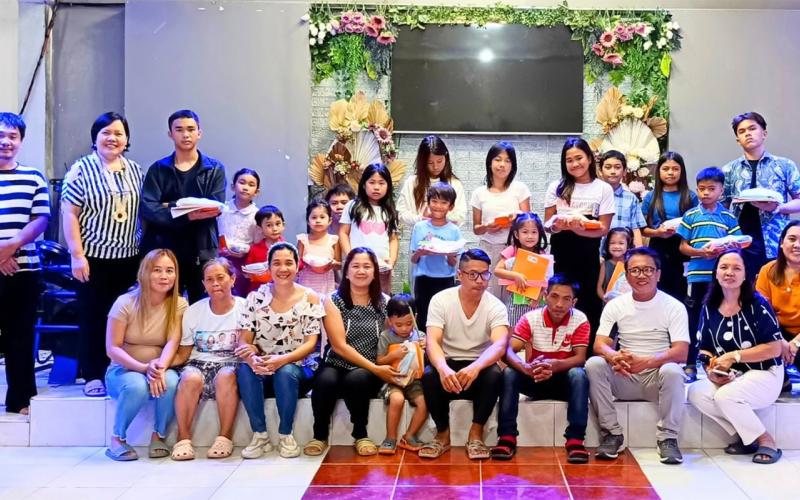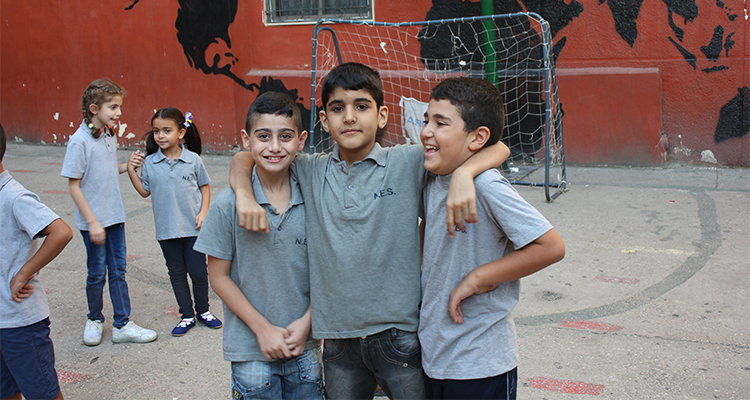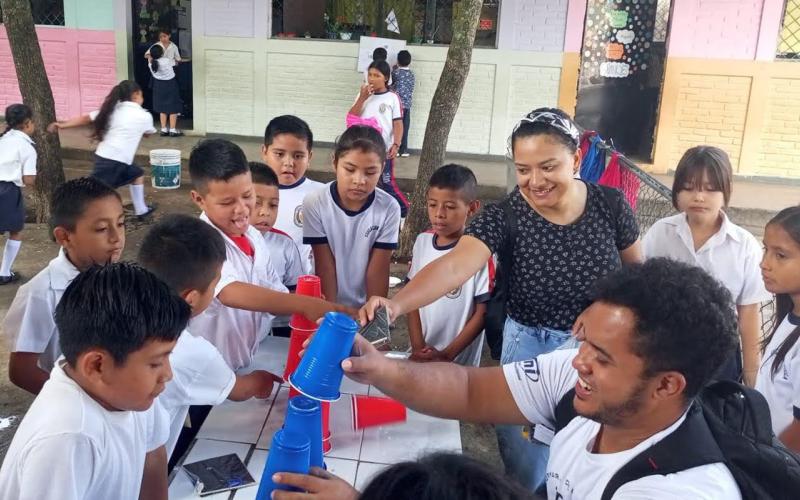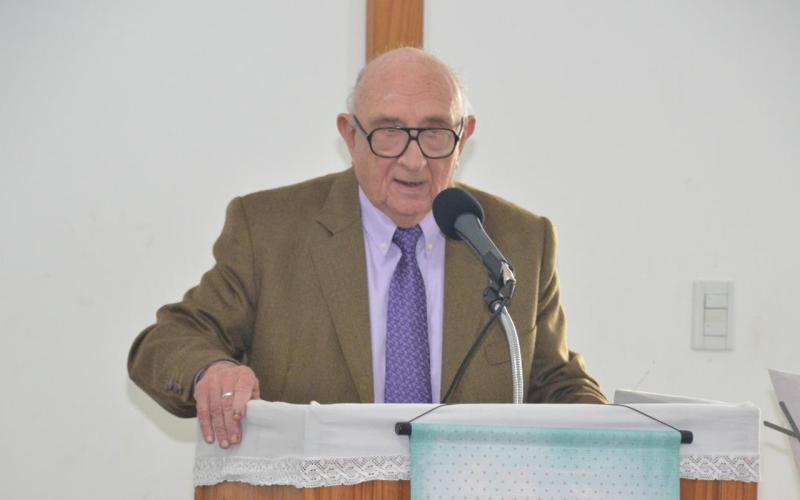
Lebanon churches invest in refugee children

If you've ever lived away from your home country, even if it was just for a semester abroad, you know how important it is to have a home away from home. A place where — even if you still miss your "real" home — you feel accepted as you are, with your differences appreciated, and where you are treated with equality, dignity, and respect. A place where you can really live, not just exist, as a valued and profitable member of society.
In the country of Lebanon, two million refugees from Syria and Iraq are hoping to find this: a home away from home, a place where they can lead a life of dignity today and need not fear tomorrow. Too many do not find it and are stuck between facing the terror of their war-torn home or succumbing to despair in the place where they have found refuge, but not life.
Yet there are others, too, that discover this home away from home – like the 70 Syrian and Iraqi children who were able to join the Nazarene Evangelical School in Beirut, Lebanon.
Teachers and students at the school— which celebrated its 50th anniversary this summer — understood long ago that all children are created equal and have the right to life and happiness. For years, the school has been accepting and successfully integrating students that other schools will not take in, such as children from Sri Lankan and Bangladeshi families. As their parents usually work in lowly esteemed cleaning jobs, most Lebanese families do not wish their children to study with them, and so even some Christian schools refuse to enroll these children.
But the NES is different. Here, Lebanese and Armenian, Sri Lankan and Bangladeshi, Nigerian and Sudanese, Iraqi and Syrian children play, learn, and laugh together. This school year, there are 210 students from more than 10 nationalities pursuing their studies at the NES, which starts with kindergarten and goes up to grade 9. The children are so used to being in class with kids from other countries that the integration of Syrian and Iraqi refugee children is a smooth process.
Nonetheless, the refugee children do have additional needs. Many of them are traumatized, have missed out on schooling, suffer poor living conditions, and are struggling with lack of acceptance in the society as a whole.
“We try to be aware of the needs of the Syrian students,” said Nabil Habiby, dean of students at NES. “So far it has worked; they have become part of the school life, which we think is very important for them.”
Every month, a special event is planned that focuses on meeting the needs of refugee children, making them feel accepted and allowing them to really live as children. School staff spend time on building relationships with their families and try to be near them in their need. On Saturdays, more than 100 children meet in clubs organized by the Nazarene church that is connected to NES. About half of them are Syrian refugees.
“The school and the clubs are a chance for them to find friends and live a normal life,” Habiby said.
In October, the school celebrated “Friendship Day.” When asked to write a note about best friends, one girl drew a picture of the school and wrote “NES – We are a family. We help others and we love others.” Another child put into words what many refugee children long for: “Thank you for standing by my side when times get hard. Thank you for making me laugh when I didn't even want to smile.”
Yet finding a new home doesn't mean forgetting one's first home. When the children watched a movie about friendship, a Syrian boy from grade 9 started to cry. “Why are you crying?” he was asked. “I was thinking of my friends from Syria, I want to know how they are doing.”
“He has a lot of friends in school. But we can't know what they're going through,” Habiby emphasized.
That's why teachers are trained regularly on how to deal with situations like this. There is now an atmosphere of acceptance and love towards the refugee children among the teachers. They have learned to take on this mission and regularly meet to pray for the kids or minister to them through chapel.
“Now most of the teachers want to give chapels,” said Marlene Mshantaf, principal of NES. "They want to give something back to the children. We're very happy about that.”
This school year, the NES has agreed to do a pilot project with Youth for Christ, which is opening a center for reconciliation. Syrian and Lebanese children will participate in the reconciliation work. While there is no actual need for this at the NES – the students are well integrated – it is another chance for the school to make a difference in the community and contribute to helping refugee children and families be accepted into society and treated with respect.
The Nazarene Evangelical School has a very good reputation and is considered one of the best schools in the area.
“We are happy about the effect we have on the society as a whole,” Mshantaf said. “Our students have the chance to be something better in life.”
There are many stories of former students who have become very successful, and several local church leaders have graduated from this school.
One of them is Andrew Salameh, who is pastoring one of the Nazarene churches in Beirut: a church that is making its own unique contribution to offering refugee children a home away from home.
In the spring of 2014, Salameh and his wife, Caroline, noticed an urgent need in their community: refugee children that could not be enrolled in Lebanese schools because they don't speak English or are too old for the classes they belong in according to their educational level. These children had no other option but to stay in their tiny homes all day, get into mischief on the streets, or engage in child labour.
In order to offer these children some hope and dignity, the Salamehs started the Syrian Temporary Education Program. STEP is now in its fourth year and this school year has added Iraqi children to the program. There are currently 44 children in kindergarten and grades 1, 2, 4 and 6 – the grades depend on the level of the children, not on their ages – who are taught the Lebanese curriculum in Arabic and English. The teachers are Lebanese, Syrians, Egyptians, and Iraqis; some are themselves former refugees.
The neighbourhood, though at first criticizing the program, has learned to appreciate what the church is doing – and “that the church is being the church,” Salameh explained.
“The idea that we have about 50 students and that we can give them hope and a future, this makes our heart very big," he said. "We are very blessed that we are able to help these children. We can look at it from any angle: there are benefits in all ways, for the teachers, for the children, for the church, and for the community. STEP is like an oasis.”
Even though STEP is not an accredited school like the NES, it has discovered a gaping need and is filling it with hope. Some of the children who have moved through the program do go on to other schools. But even the ones who do not are now able to read, write and speak English, and thus have the chance to join a vocational school. It is the difference between rejection, being treated as worthless, and having the capacity to become a valued and profitable member of society. It is the fine line between simply existing and really living.



